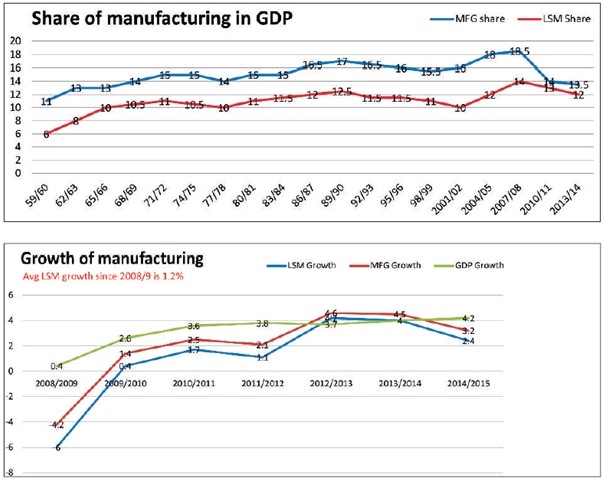Industrial stagnation in the country does not appear to be transient. It would, therefore, be unrealistic to assume auto correction.
The trend reversal will require reorientation of both the policy framework and a change in business mindset.
Sadly the government is too pre-occupied celebrating its achievements in financial management and the CPEC to worry about the persistently eroding industrial base in Pakistan.
While the recent outcry by industry in central Punjab created some ripples, people in the know said the issue has been viewed through a political lens in Islamabad and not much should be expected till the issue, somehow, metamorphs into a full blown crisis.
The blind policy of liberalisation, weak institutions and the lack of government oversight to nudge capital towards socially desirable and economically efficient avenues of investment, have led to premature de-industrialisation
The good news is that the corporate sector has taken notice and has started looking at ways to remove the systemic hurdles in industrialisation.

It wants the capital to start flowing into ventures in order to capitalise on the country’s inherent advantages in men and material along with the growing size of the domestic market.
Ghulam Murtaza Jatoi, federal industries minister, was not particularly happy with the situation.
His discomfort, however, appeared to be rooted more in his own weak position in the power corridors rather than in the slow pace of industrial growth or its premature shrinking share in the country’s GDP.
“What policy? The status of this ministry has been reduced to a post office that receives and forwards demands of the industry to the relevant departments and ministries”, Jatoi retorted in frustration over phone when approached in Islamabad.
“For this ministry to deliver, it needs to be empowered”, he insisted without coming up with a solution, if any, to promote industry.
“No industrial policy is on the cards”, confirmed Khizar Hayat Gondal, federal secretary industries.
“It is not our place to direct businessmen. We are committed to a free market. We are facilitating those concerned all we can. The government has given incentives on the import of machinery, offered tax breaks in many sectors and dedicated industrial zones. If the private sector is still not inclined to commit capital to industry and prefers other businesses, it is their choice”, he explained.
“After the 18th Amendment provincial governments have assumed a bigger role in managing their respecting the economies; this also includes industrial development.
“At least Punjab and Sindh have been active in this regard”, he added mentioning some industrial zones.
Commenting on the current weak large-scale manufacturing (LSM) data in the first quarterly report of the State Bank, he said, the closure of the Pakistan Steel Mills, fall in tractor, paper/board and cigarettes contributed to the slow down and that they were looking into it.
Ehsan Malik, CEO, the Pakistan Business Council, shared a paper on premature erosion of the industrial base.
The write-up that he said will soon be circulated contained historical data depicting the industrial slowdown and falling share of industry in the GDP.
Talking to Dawn last week he blamed the policy framework for de-industrialisation.
He considered the country’s fiscal policy anti-capital that scuttles the capacity of the corporate sector to re-plough earnings in BMR and expansion. He said the FBR, instead of broadening the base, squeezes more from tax compliant segments.
“We have articulated our perception in an eight-point agenda focusing on jobs, exports and taxes. We made a case for a strong domestic industry.
“The first point of the agenda touches on the misplaced liberalisation policy. We have pleaded that a temporary moratorium be imposed on FTA’s and PTA’s and that the old ones be possibly renegotiated.
“We now have sufficient studies that substantiate the view that these pacts are hurting more than helping Pakistan”, he argued.
Asked whether the mighty corporate sector, that multiplied manifold in its financial strength over the past four decades can be absolved of the responsibility of not doing enough to promote the industry, he opted not to reply.
The fact is that the blind policy of liberalisation, weak institutions and the lack of government oversight to nudge capital towards socially desirable and economically efficient avenues of investment, have led to premature deindustrialisation.
It meant a suboptimal utilisation of national resources in men and material compromising its growth and development potential and limiting the capacity of the economy to capitalise on abundant manpower.
The risk adverse banking sector and an undeveloped business class, lacking confidence, desperate to multiply assets quickly, reluctant to commit investment in long term manufacturing projects, played their part in accentuating the trend.
The corporate class despite its influence, particularly under dictatorial governments, resigned to a policy framework that promoted trading at the cost of industry.
The fact is many big industrial houses opened their own trading houses and turned their factories into godowns stocking Chinese imports that they merely assemble and put their brand on before it hits the market.
“Look at the 30 biggest business houses. They did succeed in multiplying their wealth but in a way that gave a crippling blow to the fragile and limited industrial base of the country.
“Instead of accepting the challenge of competition and taking pains to improve their productivity and competitiveness they opted for an easy route to quick money and hopped the bandwagon of importers”, said an expert.
“It should not surprise anyone if light engineering, home appliances, toys, pipes etc died or are dying”, he added.
Published in Dawn, Business & Finance weekly, January 9th, 2017













































